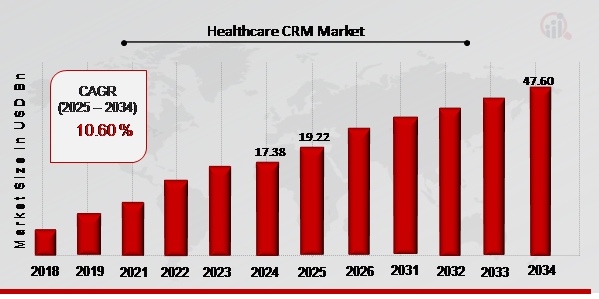The Healthcare Customer Relationship Management (CRM) Market is undergoing rapid expansion as healthcare providers increasingly adopt innovative technologies to enhance patient engagement, optimize operational workflows, and improve overall patient care. The integration of cutting-edge solutions such as Artificial Intelligence (AI), cloud computing, and big data analytics has significantly transformed the healthcare sector, making CRM systems essential. This report provides a comprehensive analysis of the Healthcare CRM market, detailing market size, key drivers, challenges, segmentation, regional trends, and emerging developments.
The Healthcare CRM Market Industry is expected to grow from 19.22 (USD Billion) in 2025 to 47.60 (USD Billion) till 2034, at a CAGR (growth rate) is expected to be around 10.60% during the forecast period (2025 – 2034).
Healthcare Customer Relationship Management (CRM) Market Overview
The Healthcare CRM market is experiencing substantial growth as healthcare organizations recognize the need for effective patient management solutions. Market projections indicate continuous expansion, driven by technological advancements and the increasing focus on patient-centric care.
Key players in this market include,
Sugar CRM (US)
SAP SE (Germany)
Keona Health (US)
Microsoft (US)
Infor Inc. (US)
Healthgrades (US)
Oracle (US)
Influence Health (US)
Accenture (Ireland)
Sample Copy of the Report @
https://www.marketresearchfuture.com/sample_request/7324
The Healthcare CRM market is evolving rapidly, driven by the need for efficient patient management solutions, regulatory compliance, and technological advancements. As healthcare organizations continue to invest in CRM systems, emerging trends such as AI, cloud computing, and mobile applications will shape the future of the market. The increasing integration of predictive analytics, IoT, and blockchain technology is expected to further enhance the functionality and security of Healthcare CRM platforms. The market will continue to expand, addressing key challenges while providing innovative solutions to optimize patient care and operational efficiency.
Key Drivers of the Healthcare CRM Market
- Rising Demand for Patient-Centric Care: The shift toward personalized and patient-centered care models is a significant driver for CRM adoption. Healthcare providers leverage CRM systems to streamline communication, track patient interactions, and improve patient satisfaction.
- Technological Advancements: AI and machine learning integration in CRM solutions enable predictive analytics, automation of administrative tasks, and improved patient outcome predictions. These capabilities enhance the efficiency of healthcare operations.
- Growing Adoption of Telehealth: The rapid expansion of telehealth services necessitates CRM solutions to efficiently manage virtual patient interactions. CRM platforms support scheduling, communication, and follow-ups, ensuring seamless remote care.
- Regulatory Compliance and Data Management: Compliance with regulations such as HIPAA requires advanced CRM systems to ensure data security and proper handling of sensitive patient information. Secure CRM solutions help healthcare organizations manage and store patient data effectively.
Healthcare CRM Market Segmentation
The Healthcare CRM market is segmented into various categories based on type, components, mode of delivery, and end-users.
In terms of type, Healthcare CRM is classified into Operational CRM, Analytical CRM, and Collaborative CRM. Operational CRM focuses on streamlining daily healthcare operations, while Analytical CRM helps in data-driven decision-making. Collaborative CRM enhances communication and coordination among healthcare providers, improving patient care.
Regarding components, Healthcare CRM consists of Software and Services. The software component includes platforms and applications that facilitate patient relationship management, while services encompass consulting, implementation, and support.
The mode of delivery for Healthcare CRM solutions is categorized into Cloud-Based and On-Premise models. Cloud-Based CRM offers scalability, remote accessibility, and cost efficiency, whereas On-Premise solutions provide greater control and security for healthcare organizations.
Lastly, Healthcare CRM serves various end-users, including Hospitals & Clinics, Diagnostic Centers, Imaging Centers, and Research Institutes. Hospitals and clinics utilize CRM systems to enhance patient engagement and streamline operations. Diagnostic and imaging centers benefit from CRM solutions by managing patient data efficiently. Research institutes leverage CRM for data analysis and collaboration.
Overall, Healthcare CRM plays a crucial role in improving patient care, optimizing healthcare processes, and enhancing communication among stakeholders.
Challenges and Restraints
Data Security Concerns:
The handling of sensitive patient information raises concerns about cybersecurity threats and data breaches. Healthcare organizations must implement stringent security measures to protect patient data.
High Implementation Costs:
The initial investment and ongoing maintenance of CRM systems can be expensive, particularly for small and medium-sized healthcare providers.
Organizations must balance cost-effectiveness with the need for advanced CRM functionalities.
Integration Complexity:
Integrating CRM solutions with existing healthcare systems, such as electronic health records (EHRs), can be complex and time-consuming.
Interoperability issues may hinder seamless data exchange between platforms.
You Can Purchase Complete Report @
https://www.marketresearchfuture.com/checkout?currency=one_user-USD&report_id=7324
Emerging Trends in the Healthcare CRM Market
AI-Powered CRM Solutions:
AI-driven analytics and chatbots enhance patient engagement by automating interactions and providing real-time assistance.
Predictive analytics helps identify high-risk patients, allowing healthcare providers to implement proactive care strategies.
Cloud-Based CRM Systems:
The adoption of cloud technology enables scalability, flexibility, and cost-efficiency for healthcare providers.
Cloud-based CRM platforms facilitate remote access to patient data, improving care coordination.
Mobile CRM and Patient Apps:
The proliferation of mobile health applications allows patients to manage appointments, access medical records, and receive timely health updates.
Mobile CRM solutions enhance patient engagement and communication with healthcare providers.
Predictive Analytics for Patient Insights:
Advanced CRM systems leverage predictive analytics to assess patient health trends and personalize treatment plans.
Data-driven insights help healthcare providers allocate resources effectively and improve patient outcomes.
Integration with IoT and Wearable Devices:
The increasing use of wearable health devices generates real-time patient data, enabling better monitoring and decision-making.
CRM platforms integrate with IoT-enabled devices to enhance remote patient management.
Blockchain for Enhanced Security:
Blockchain technology is being explored to improve data security, ensure transparency, and enhance patient record management.
Decentralized data storage reduces the risk of data manipulation and unauthorized access.
Media Contact
Company Name: Market Research Future
Contact Person: Media Relations
Email: Send Email
Country: United States
Website: https://www.marketresearchfuture.com

